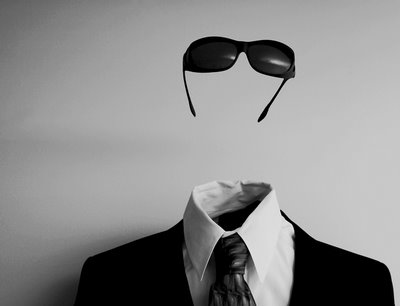From Sunday's Taipei Times:
Floods of demonstrators took to the streets in Taipei City yesterday, venting their anger at the [KMT] administration of President Ma Ying-jeou (馬英九) and its policies, which they said threaten Taiwan’s sovereignty.
Protesters young and old marched under banners reading “Oppose toxic products, defend sovereignty,” “Defend Taiwan,” “I am Taiwanese, not Chinese” and “Taiwan is not part of China,” demanding that Beijing apologize to Taiwan for selling milk and other products tainted with the industrial chemical melamine.
[…]
Event organizers estimated that more than 600,000 people took part in the rally, while Taipei police said they would not provide an estimate.
Of course, rally organizers DO have a vested interest in inflating participation figures. Though it is telling when local police (who are notorious for low-balling anti-KMT protest numbers) uncharacteristically REFUSE to provide their own estimates…
At any rate, I was one of the five or six hundred thousand people there. Arrived at Bo Ai Road (the camera shop street) about 7 pm. I must say, the commercial area was pretty dead for a Saturday night. Had dinner, and walked over to Ketagalan Avenue. Miscalculated where I was going in the dark, and wound up behind the stage, facing the Presidential Building. Saw a small group of people engaged in a sit-down protest behind the barricades. And I also saw streaks of green laser light in the night air, aimed at the Presidential Building.
At the time, I had no way of knowing that the lasers were being used to trace the Chinese characters for "Incompetent" on President Ma Ying-jeou's offices. Looking at the picture I took now, you can see the neon green characters at the main entrance under the central tower. It's partially obscured by the steel girder of the barricade, however.
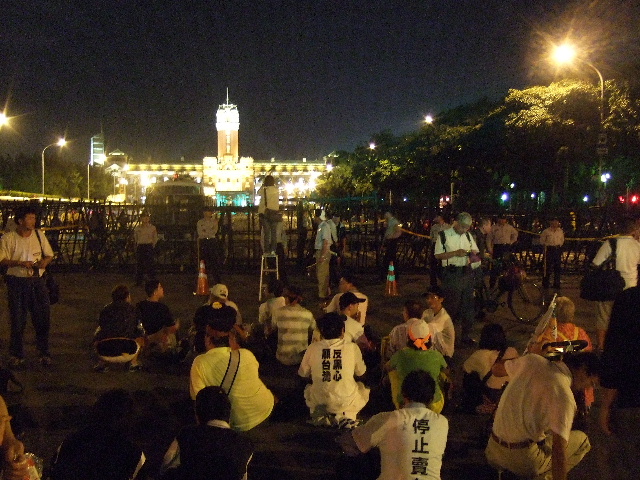
This is the best zoom of the above picture I could manage with a photo editor program:
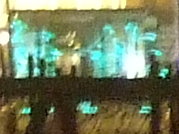
(According to Babelfish.com, the Traditional Chinese characters for "incompetent" are 無能.)
After that, I made a wide detour along a side street so I could take a gander at the stage. Here 'tis:
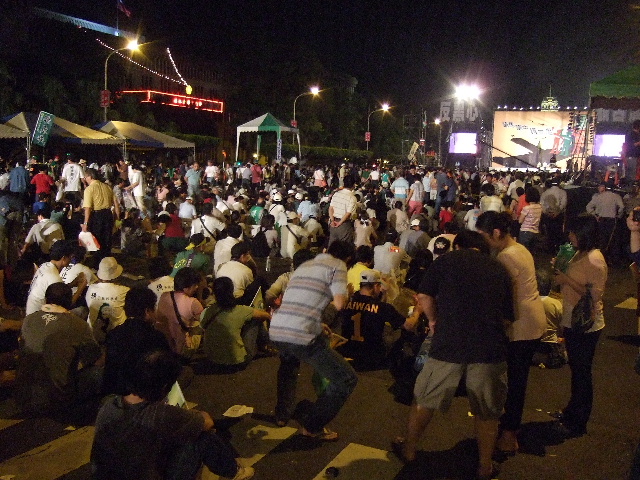
Unfortunately, the photo compresses the distances involved, making it appear as though there's only a few hundred there. I figured a few thousand — ten thousand, tops. Frankly, I was a little depressed at what I thought was a low turnout. But hey, I got there near the tail-end of the rally. Sunday's Taipei Times featured a shot from earlier Saturday:
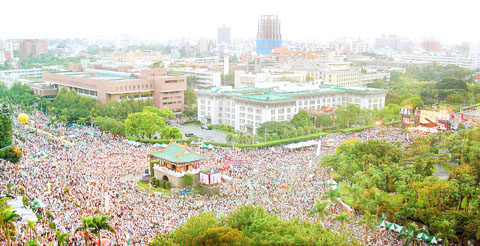
(Image from the Taipei Times)
That's certainly more like it. Anyways, here's one more of my own pics, when folks became animated over something the speaker said:
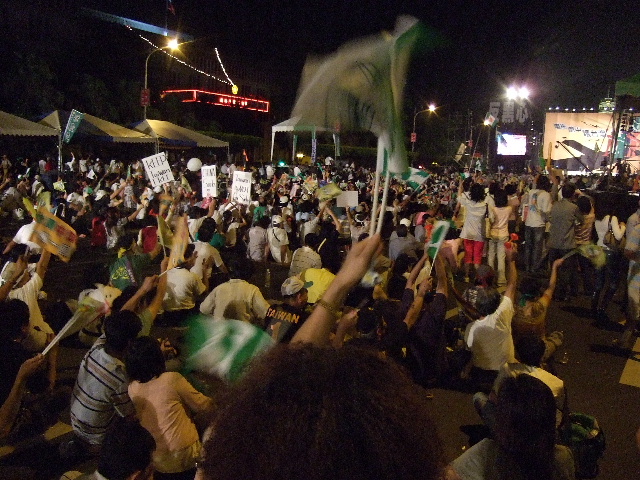
A software zoom of those three placards at the top-left:
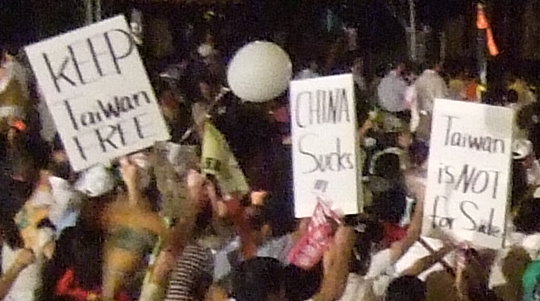
A short video of one of the tunes that was sung:
Suffering from a killer headache and allergy-induced exhaustion, I left after about an hour. But not before snapping this giant "Chinese Baby Milk" balloon:
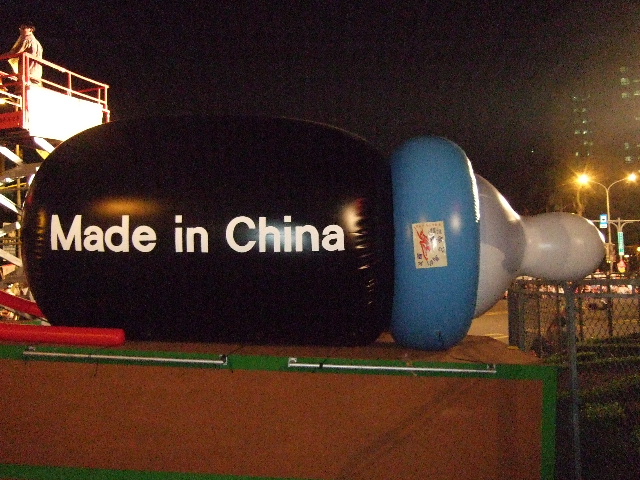
And not before getting a couple shots of this banner:
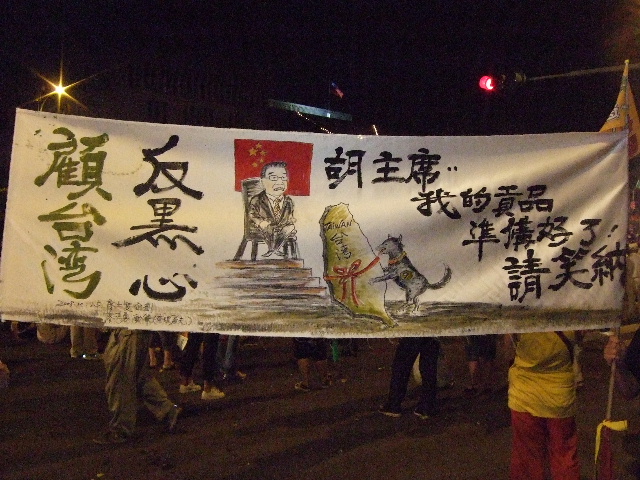
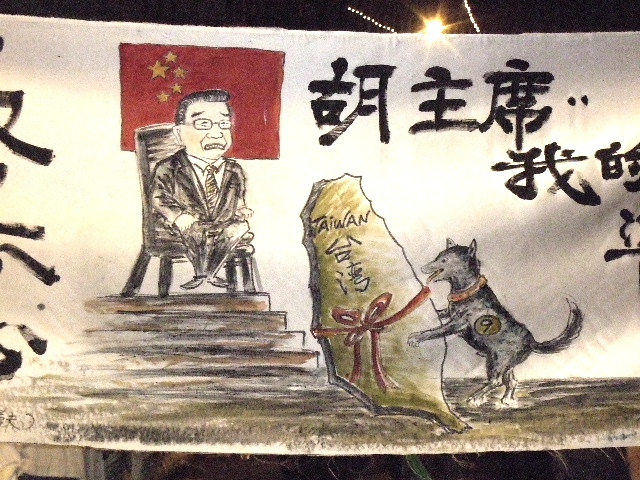
I assume the "running dog" is Taiwanese President Ma Ying-jeou, delivering his country into the hands of Chinese President Hu Jintao. No idea what the #9 is supposed to signify, however. [UPDATE: See comments section for the answer.]
UPDATE #1: On Monday, the Chinese Association for Relations Across the Taiwan Strait (ARATS) issued an apology for the ill effects the melamine milk adulteration scandal has had on the Taiwanese economy.
So let's review. ARATS has had a MONTH to apologize — and they only do it ONE WEEK before their delegation arrives in Taiwan. Or, make that TWO DAYS after HALF-A-MILLION are hacked off enough to take to the streets in an anti-unification march.
Life's just full of coincidences like that, I guess . . .
UPDATE #2: It should be noted that ARATS is an unofficial Chinese organization, so any apology they happen to issue is also, perforce, unofficial. But even were Hu Jintao himself to apologize tomorrow, the fact would remain that sorries don't butter no parsnips. Taiwanese bakeries are still going to go bankrupt no matter how effusive Chinese statements of regret are. (Or rather, AREN'T.)
Incidentally, that story from Monday's Taipei Times featured this howler:
. . . [Taiwanese negotiators were assured that ARATS] would make every effort to mete out severe punishment to those held responsible . . .
Errr, the Communist Party of China KNEW about the melamine milk problem at least as far back as August, but kept silent in order not to tarnish the glory of the Genocide Games.
So we will anxiously await the day when the Elliot Nesses of ARATS "mete out severe punishment" to all those nasty communist party chiefs . . . the same chiefs, by the way, who appointed our incorruptible investigators to their cushy ARATS jobs in the first place!
i-9/10
